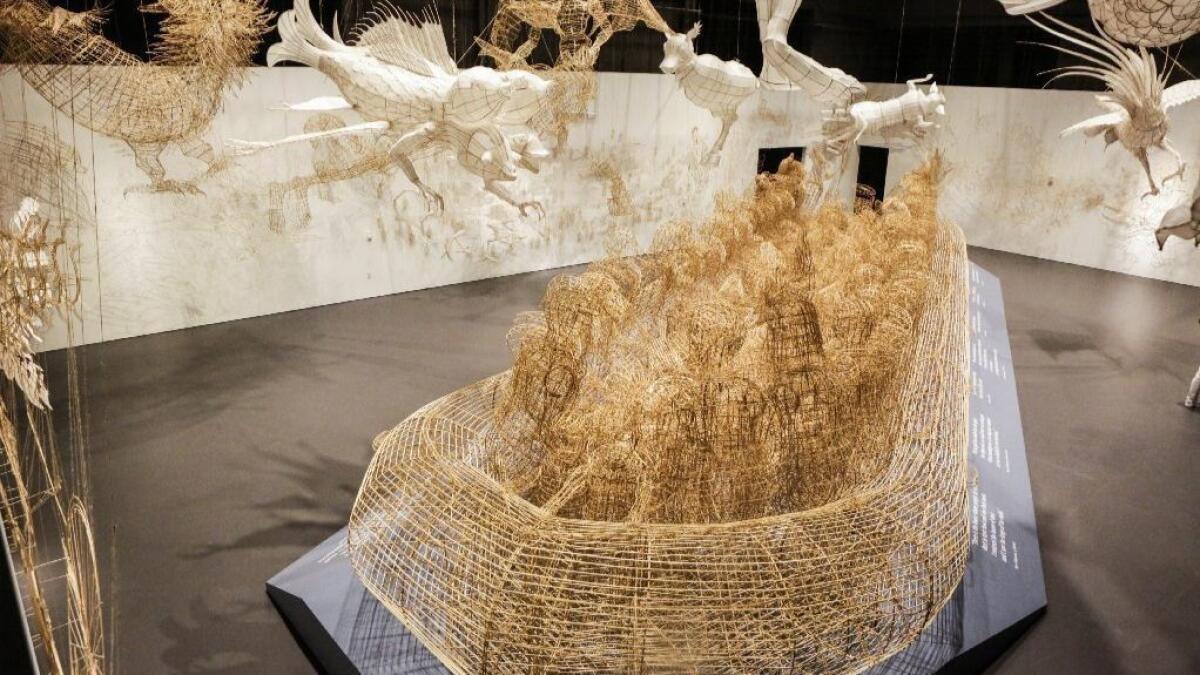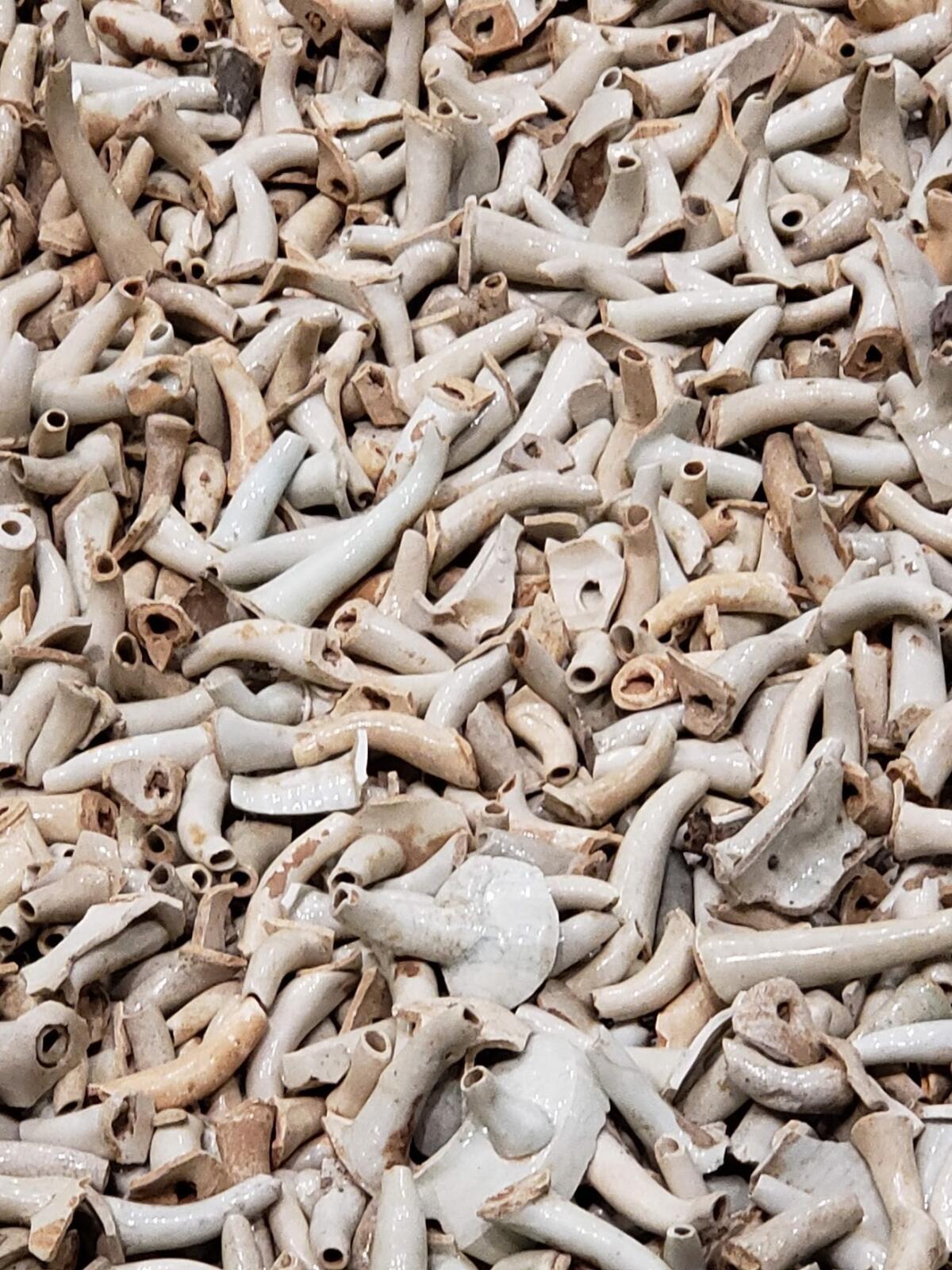Review: ‘Ai Weiwei: Life Cycle’ brings tradition and transformation to the Marciano Art Foundation

- Share via
Seedbed, boneyard, vessel.
The three primary elements of a new, somewhat imbalanced exhibition by sculptor and Conceptual artist Ai Weiwei speak to fundamentals of birth, death and transformation. “Life Cycle,” as the show is titled, opens Friday at the Marciano Art Foundation. With one new large-scale work and two earlier installations, it is, remarkably, the celebrated Berlin-based Chinese artist’s first major Los Angeles show.
The seedbed, “Sunflower Seeds,” is a vast field composed of tons of black, white and gray seeds, spread smooth and flat in an enormous, 4,000 square-foot rectangle with thickly beveled edges. Shown in the foundation’s cavernous Theater Gallery, it is a version of the work Ai showed in the Turbine Hall at London’s Tate Modern in 2010. Each tiny seed, actually a bit of porcelain hand-formed and painted, is a kind of surrogate for the individuals who collectively form the mass of humanity.
Together they bristle with energy – actual and potential.

Adjacent is “Spouts,” a similarly composed arrangement created in 2015. A boneyard, this floor sculpture is made from thousands of broken porcelain teapot spouts, glistening in off-white, celadon and tan. Like the seedbed, this work merges the traditional Chinese identification with porcelain, as old as the Han Dynasty 2,000 years ago, and its proliferation around the world through international trade, especially after the 16th century launch of Europe’s colonial adventuring.
In teapots, spouts are the pathway for inner warmth to transfer to the outside world, spreading solace and comfort. Given the repressive regime governing China, the word also invokes Ai’s own history as a political dissident – one who spouts unacceptable views. The visual similarity with bleached and decaying bones layers inhuman tragedy atop the ordinary passage of historical time.
Finally, the Theater Gallery’s old orchestra pit holds the large new sculpture, crafted from bamboo and silk. “Life Cycle” is based on the shape of an inflatable boat, the kind most recently seen being used in the Mediterranean by refugees fleeing Middle East trauma. Three dozen figures are seated around the raft’s periphery, upright like sentinels.
The bamboo and silk materials, traditionally used to make kites, are repeated in a group of sculptures of mythological beasts suspended from the ceiling around the boat. Think fantastic constellations and signs of the zodiac, staples of Ai’s sculptural repertoire, as well as the monsters Goya warned would proliferate with the sleep of reason.
Visually translucent, bamboo and silk lend a ghostly aura to the raft and hovering creatures. The pedestal on which the vessel stands is printed with quotations from philosophers and writers – Homer, St. Augustine, Kafka and more – all on themes of openness and benevolence.
“I am not an Athenian or a Greek, but a citizen of the world,” Socrates insisted. It is a characterization the artist has likewise embodied in his peripatetic travels and his view of global society as at once intimate and expansive.


The seedbed and the boneyard benefit from their unfussy mix of spare, Minimalist formality and slowly bubbling Conceptual complexity. Scale and repetition draw you in, and your mind begins to roam.
“Life Cycle,” by contrast, seems to be trying too hard. Perhaps in agitated response to the desperation of the refugee victims of inhumane cruelty, which extends to recent events closer to home at the border between the United States and Mexico, the work feels, if not exasperated, certainly argumentative. The quotations are like academic footnotes, as if such are needed. For all its heartfelt compassion, the sculpture doesn’t carry the quiet, stately power of “Sunflower Seeds” and “Spouts.”
Additional works by Ai Weiwei will also be seen in two gallery exhibitions opening in the next several days. “Zodiac” opens Saturday at the new Jeffrey Deitch Gallery, 925 N. Orange Drive, in Hollywood. “Cao/Humanity” will be at UTA Artists Space, 403 Foothill Road, Beverly Hills, beginning Thursday.
Marciano Art Foundation, 4357 Wilshire Blvd., (424) 204-7555, through March 3. www.marcianoartfoundation.org
Twitter: @KnightLAT
The biggest entertainment stories
Get our big stories about Hollywood, film, television, music, arts, culture and more right in your inbox as soon as they publish.
You may occasionally receive promotional content from the Los Angeles Times.








